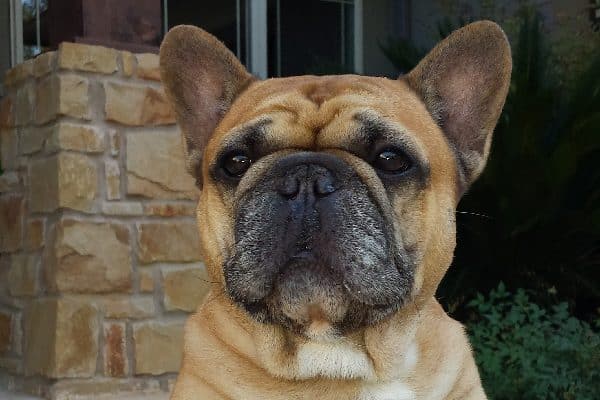Dr. Barchas,
I have a Bulldog. He has a dry hacking cough and some choking. Because I can’t afford to take him to the vet, what can I give him to help with his coughing?
Ronald
Fort Worth, Texas
I think Bulldogs are really cool. They always have big, fun personalities. But humanity has not been kind to the Bulldog. We have bred them to have problems with their limbs and especially with their hips — a shocking proportion of Bulldogs suffer from hip dysplasia. Some breeds of Bulldog are unable to deliver puppies without a caesarian section. Bulldogs may be especially prone to epilepsy. The list of problems that humans have given to Bulldogs is long. However, there is no doubt that the Bulldog face is the worst curse that humanity has bestowed upon Bulldogs.
Some would argue that the face — with the smooshed in nose — is the signature characteristic of a Bulldog. Unfortunately, it is the cause of many Bulldog problems.
It turns out that most of the nose and mouth tissue present in dogs with long snouts also is present in Bulldogs. But in Bulldogs, the tissue is crammed into a much smaller space. That means that during breathing, air must squeeze through narrow, tortuous nasal tissues. And on top of that, Bulldogs are prone to small nasal openings (the technical term is stenotic nares). When you put it all together, every breath for a Bulldog can be a struggle. When Bulldogs (and Pugs, Pekingese, and Boston Terriers) suffer from breathing problems related to their short noses, the condition is called brachycephalic syndrome.
And it gets worse: Dogs with short noses also are prone to swallowing problems, which can predispose them to inhaling food into the lungs — a condition known as aspiration, which can lead to serious pneumonia. When Bulldogs vomit, they are also especially prone to aspiration.
Ronald, the coughing and choking you are witnessing is likely related to the redundant, convoluted tissues in your dog’s nose and throat. In other words, I suspect that brachycephalic syndrome is the cause of the symptoms. You should be aware that these problems can progress to more serious ones — I frequently treat Bulldogs who are suffering from severe, life-threatening respiratory distress as a result of brachycephalic syndrome.

I do not recommend any over-the-counter medications for Ronald’s situation. No over-the-counter medication really works for brachycephalic syndrome. I should also point out that without an exam I cannot guarantee that brachycephalic syndrome is the cause of the problems.
However, there are steps that any Bulldog owner should consider when confronted with mild choking, gagging, or coughing. The most fundamental of them is weight management.
Bulldogs are prone to obesity, and overweight dogs suffer much more seriously from brachycephalic syndrome for a number of reasons. By the same mechanism in which obesity contributes to snoring and sleep apnea in people, overweight dogs experience enlargement of the tissues in the mouth and throat as they are infiltrated with fat. This exacerbates all of the problems associated with brachycephalic syndrome. Fat overlying the chest also can increase the effort required to breathe. Ronald, I recommend that you keep your dog lean.
Excitement and heavy exercise increase respiratory needs, and these should be avoided to the extent possible in dogs with brachycephalic syndrome. And, although it’s winter now, remember that summer heat dramatically exacerbates the problem as well. The classic dog that experiences a life-threatening crisis from brachycephalic syndrome will be an overweight one who played rambunctiously on a hot day. Don’t let your dog be that dog.
Finally, I should point out that I was initially hesitant to publish Ronald’s question, because breathing issues are always potentially serious. The Internet generally is not the best place to go when you have a question about your dog’s breathing — I always recommend an immediate veterinary check up in these types of cases. Also, Ronald, you should be aware that there’s a chance I’ve been barking up the wrong tree with my response. It is possible that your dog has pneumonia, or a windpipe problem, or some other issue that is not related to brachycephalic syndrome. If you can muster the resources, a vet visit is the best option by far.
Got a question for Dr. Barchas? Ask our vet in the comments below and you might be featured in an upcoming column. (Note that if you have an emergency situation, please see your own vet immediately!)
Featured Image Credit: John Fedele/Getty Images









